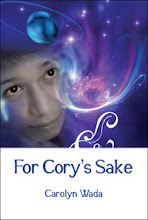The Los Angeles Times article I sourced reported that Los Angeles county has six facilities staffed by "forensic pediatricians and other experts trained to spot abuse," but that Dae'von was never taken to one of these facilities. They also reported that:
"In the wake of Dae'von's death, Supervisor Gloria Molina has proposed a pilot program in parts of the San Gabriel Valley and the Eastside in which all children who come to the county's attention as possible child-abuse victims would be examined at [one of these facilities]."
This suggested action caught my attention. After a bit of dithering (I used to live in Los Angeles but have since moved), I sent an email to Supervisor Molina's office. I quoted the Times report of her proposal. I expressed my opinion that this action would rescue more children. I asked if she was moving forward with the proposal and how I could stay informed of its progress.
I received a prompt reply from Martha Molina-Aviles, Senior Children, Senior and Family Deputy to Supervisor Molina. Ms. Molina-Aviles assured me that she was moving forward with the proposal. Specifically, she is working with county departments to develop a protocol to see more [possibly abused] children at the LAC+USC East San Gabriel Valley Medical Hub.
I felt hopeful after reading this response. In the past three weeks, the importance of forensic (child abuse) pediatrics has come strongly to my attention. Two days before Dae'von's death, a 2-month-old baby was hospitalized with severe brain damage, with the father admitting to handling him roughly (including shaking, smothering) on many occasions. Jack Koller was examined by doctors just days before his hospitalization. He was diagnosed with what in hindsight an expert called "a 'classic' sign of infant abuse," but abuse was not suspected at the time.
They say on the forensics dramas that the body tells tales. This is an important point when it comes to discovering child abuse, a physically harmful crime whose victims are often much less capable of voicing than adults, or even pre-verbal. Let's not wait until the final critical hospitalization, or the autopsy, to listen. Let's get specialty training to doctors, and possibly abused children to specially trained doctors. Children's cancers have specialists. Chronically ill children are seen by specialists. Violence can be life-threatening too.
Child abuse pediatrics is apparently a growing sub-specialty. A recent AP article on the subject was enlightening. I will respect the copyright injunction not to publish, broadcast, rewrite or redistribute the AP material, but I think they will not mind my linking to it, with a synopsis. The article touches on the need for the sub-specialty, its growth, the limitations in (child abuse symptoms) knowledge and training among general practitioners, and potential drawbacks and cautions to the growth of this sub-specialty.
Even after reading the cautions, I would prefer to see this sub-specialty grow. I would like to know that more doctors are being trained to recognize the symptoms of abuse. I would like to know that possibly abused children are being seen by doctors trained to recognize what their bodies are saying. Even "at the least," a doctor trained in these symptoms will rescue children from real torture--and this is a lot.
I receive much of my story leads from Twitter users. There is a community of focused, passionate child advocates on Twitter, and much thought-provoking conversation on-going on the micro-blogging site. I found the enlightening AP article via @childrensrights and @lhinkle. Thank you.




No comments:
Post a Comment